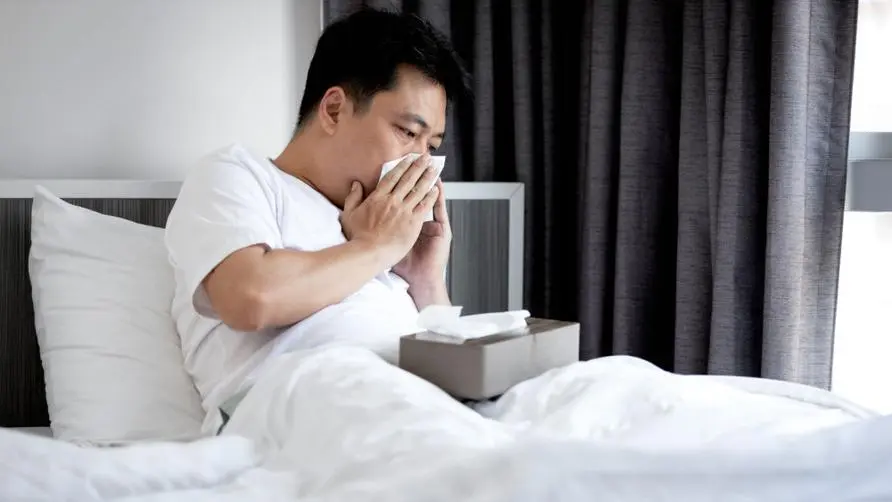A must-see for those with allergies! Pharmacist reveals the benefits of new generation "antihistamine": drowsiness and side effects are greatly improved

Many people with allergies take “antihistamine” drugs to relieve symptoms. However, why is it that some antihistamine drugs are particularly likely to cause drowsiness after taking them, but some do not? The Taiwan Ministry of Health and Welfare, Food and Drug Administration and pharmacist Guo Jianhong jointly explained to the public the characteristics and usage precautions of different antihistamine drugs, as well as how to deal with emergency symptoms.
Severe allergies may lead to shortness of breath and shock! Why can “antihistamines” improve allergy symptoms?
Pharmacist Guo Jianhong explained that the principle between allergic reactions and antihistamines is that when the body encounters an allergen for the first time, the body is induced to produce “immunoglobulin” (IgE); when it encounters an allergen again, IgE It will identify allergens and trigger an immune response, causing the mast cells in the body to release histamine, causing the body to experience allergic reactions such as redness, swelling, itching, heat or runny nose. In severe cases, it may even cause rapid heartbeat, shortness of breath and even shock.
Pharmacist Guo Jianhong said that if you take anti-histamine drugs at this time, it can act on histamine receptors so that histamine can no longer bind to the receptors, thus blocking the progression of allergic reactions and improving allergic symptoms. Currently, antihistamine drugs can be divided into two types: the old generation and the new generation. Some of the new generation antihistamines are derived active metabolites or mirror image isomers, and the dosage required for these drugs is relatively high. Low, also known as “third generation antihistamine”.
What are the differences between the old and new generations of antihistamines? Pharmacist reveals key differences in “side effects”
Pharmacist Guo Jianhong pointed out that common ingredients of the old generation of antihistamines, such as Dexchlorpheniramine, Diphenhydramine, Doxepin, Hydroxyzine, etc., are “lipophilic” ingredients. In addition to binding to histamine receptors, they can also pass through the blood-brain barrier, enters the central nervous system of the brain and acts on receptors other than histamine receptors, thus causing side effects such as drowsiness, difficulty concentrating, dry mouth, and difficulty urinating. When used on the elderly, there are rare cases of side effects such as confusion and cognitive impairment.
The common ingredients of the new generation of antihistamines, such as Cetirizine, Desloratadine, Fexofenadine, Loratidine, etc., are hydrophilic ingredients and cannot enter the brain through the blood-brain barrier, so they are less likely to cause side effects such as drowsiness and lack of concentration. The Taiwan Food and Drug Administration added that certain new-generation pharmaceutical ingredients have been found to cause cardiac arrhythmias in the past, but these ingredients are no longer used, so the public does not need to worry too much.
Antihistamines causing drowsiness, poor concentration? “8 Groups” must be directed by a physician before taking it
Although antihistamines can help relieve allergic reactions, pharmacist Guo Jianhong still reminds that before using antihistamines in specific groups, be sure to obtain the instructions of a physician or pharmacist before use, such as pregnant women, prostate hypertrophy, difficulty urinating, glaucoma, and high blood pressure. and those with poor heart, liver, and kidney functions. In addition, if breastfeeding women take antihistamines, a small amount may be present in the milk, so it is not recommended for breastfeeding women. Patients with thyroid disease can use antihistamines.
Pharmacist Guo Jianhong explained that common side effects of antihistamines include drowsiness, inability to concentrate, etc. Therefore, antihistamines should not be used when driving, riding a bicycle, or operating precision instruments or large machinery to avoid danger. Children are prone to accidentally drinking excessive amounts of antihistamine drops, which may cause severe side effects such as blurred vision and difficulty urinating. Therefore, be sure to pay attention to the dosage used by children. In addition, antihistamines should also be avoided with alcohol, fruit juice, grapefruit juice, etc. to avoid interactions.
As for which is better, the old generation or the new generation antihistamines? Pharmacist Guo Jianhong said that there is no absolute advantage or disadvantage between the old and new generations. Doctors or pharmacists will provide suggestions based on the needs of patients. For example, the older generation of antihistamines are prone to drowsiness side effects, and doctors may use them to assist allergic patients to achieve sleep-aiding effects. Therefore, when seeking assistance from professional medical personnel, if you wish to avoid the side effects of drowsiness, you can inform the medical personnel as well.
Source:
Further reading:
Are e-cigarettes healthier? Don’t be stupid. Just smoking will make you unable to get hard!





